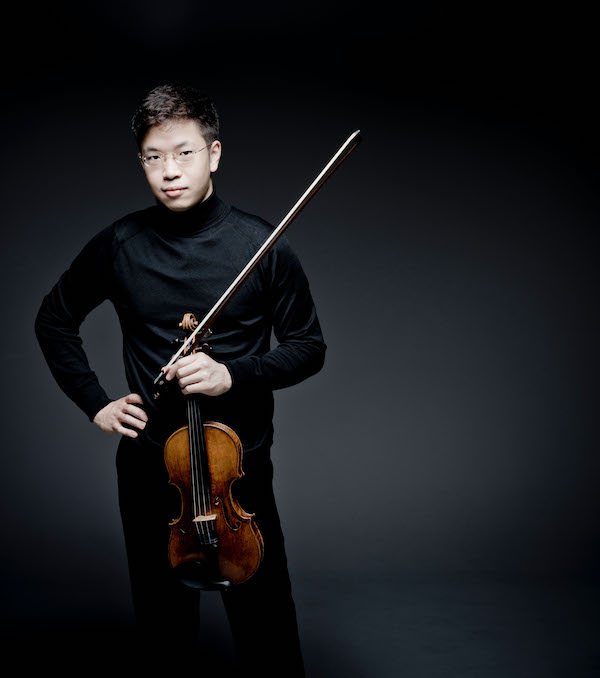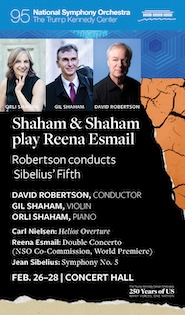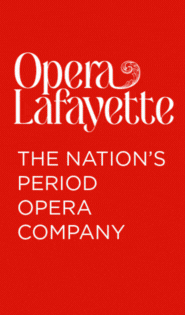Violinist Huang conveys wartime violence and reflection in Wolf Trap program

Violinist Paul Huang performed at Wolf Trap Friday night. Photo: Marco Borggreve
Violinist Paul Huang has given some striking ensemble performances over recent years on Wolf Trap’s chamber music series. Friday night in the Barns, a large audience had the chance to hear him in a solo recital, accompanied adroitly by pianist Anne-Marie McDermott. The challenging program, carefully selected to highlight connections among pieces, elicited both startling virtuosity and lyrical beauty from both musicians.
Intense concentration marked the opening piece, Arvo Pärt’s meditative Spiegel im Spiegel, in its original form for violin and piano. After letting the room settle into silence, McDermott began the stream of simple arpeggiated chords in her right hand, kept extremely soft and regular in triplet patterns. Huang added only minimal vibrato to his part’s stepwise scalar ascents or descents in long notes, unspooling them in longer and longer chains, a compositional device that seemed to stretch the fabric of time.
The performers asked for there to be no applause after the Pärt work. Honoring that request, the audience settled into a quiet repose that lasted the whole evening long, even as later pieces shattered it violently. The silence heightened awareness of musical connections between Spiegel im Spiegel and the work that followed it, Prokofiev’s Violin Sonata No. 1, especially that it shared the same keynote of F, but shifting darkly from major to minor.
Prokofiev began working on this sonata after his ill-fated return to the Soviet Union in the 1930s. His experiences there during World War II, during which he was evacuated to the Caucasus to escape Nazi attacks on civilians, mark the more violent parts of the sonata. Prokofiev completed the piece in 1946, winning him the Stalin Prize the following year. In an ironic turn, Russia is now carrying out a similarly barbaric war in Ukraine, where Prokofiev was born in Donetsk.
Huang’s almost infallible technique made the brutal double-stops of the first movement forceful and perfectly tuned, while also making clear melodic sense even in their surprising turns. McDermott could have been harsher in her attacks, but the svelter side of her touch at the keyboard served the misty sheen of Huang’s ghostly runs toward the end of the first movement—a gesture the composer likened to “wind in the graveyard.”
Huang hammered the machine-gun accents of the first part of the second movement, marked “marcatissimo” and often syncopated brutally against the meter. Huang and McDermott provided savage contrast in the contrapuntal theme offset by minor seconds, against more lyrical passages reminiscent of the composer’s ballet music for Romeo and Juliet.
In this context of this concert, Prokofiev’s serene third movement hearkened back to the Pärt piece, set like it in F major and with recurring triplet patterns. Huang barked intensely on the low G string, later soaring angelically on the highest string. The tour de force Finale thrilled, a raucous dance in wildly shifting meter, difficult to coordinate. The return of the graveyard wind melismas, now even more muted, reinforced the sense of wartime tragedy.
The only misstep in the program was the inclusion of Mozart’s Violin Sonata No. 24, offering a moment of lighter entertainment but one that didn’t quite fit with the rest of the program. Both musicians played with clean articulation and polished tone. Opting not to repeat the exposition made the first movement, already short with a truncated development and no coda, even more compact. The demure slow movement and bouncy concluding rondo did little to dispel the notion of music that was cleverly played but in a somewhat pedestrian rendering.
Huang responded better to the greater demands of John Corigliano’s Sonata for Violin and Piano, hitting outstanding high flautando notes in the rollicking first movement. The second movement had a film-score sweetness redolent of 1960s New York, where Corigliano had his first compositional success after graduating from Columbia. After a booming, intense third movement, with more astounding double-stop work from Huang, the Finale seemed pure carnival, absurd torrents of notes around a more introspective middle section.
The encore, a super-schmaltzy arrangement of the Irish tune “Londonderry Air” (known best by the words of “O Danny Boy”), was no less odd a choice than the Mozart earlier in the program. Pleasurable, perhaps, but not of a piece with the rest of the concert.
The Emerson String Quartet makes a stop on its farewell tour to play an all-Beethoven program 7:30 p.m. December 9. wolftrap.org




